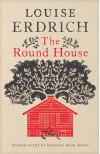 Published by Corsair 8 May 2013
Published by Corsair 8 May 2013
352pp, hardcover , £11.51
Reviewed by Elsbeth Lindner
Prize-winning books don’t always appear to justify their accolades but in the case of Louise Erdrich’s The Round House, there’s no question, this is a novel that deserves its National Book Award. Erdrich, the author of 14 novels as well as poetry, short stories and children’s books, has achieved a book of remarkable quality. Not only compellingly readable and cleverly plotted, it presents the appalling facts of the expropriation of Native American lands and children in a manner both completely integrated into the storytelling yet shocking enough to pierce the reader’s emotions as if for the first time.
But this is no bald polemic. It’s in fact a coming-of-age story of unusual impact, narrated boldly and convincingly from the point-of-view of a thirteen-year-old-boy living on a reservation in North Dakota, with a layer of adult retrospection on top. There are flavours of Spielberg, Dickens and Tom Sawyer to the tale of a group of small town boys, their jokes and entertainments. However for young Joe Coutts, the son of a judge, this will be a scarring story of lost innocence, as telegraphed in the opening scenario which shifts from happy (if heavily symbolic) times with his father to the traumatized arrival of his mother.
Episodes of levity and family warmth to one side, this is a very dark book that hinges on a devastating rape and considers morality from many angles. There’s a striking intricacy to Erdrich’s weaving of profound and heart-wrenching themes into compelling storytelling. Sometimes the book is a thriller, sometimes a detective story, sometimes a family drama, sometimes a smouldering act of sexual awakening.
What impresses most, however, is the integrity of the narrative which culminates in an action taken by the protagonist from which a less able writer would have shied away.
Spiritually enlightening and morally insightful, this is a book of many facets, centered on the round house itself, a symbol of the female heart of Native America. Erdrich referred to this when accepting the prize, acknowledging ‘the grace and endurance of native women.’ The postscript adds a further layer of information by explaining that the novel emerged from exceptional circumstances. This only intensifies the reader’s respect for a gifted writer who has delivered a novel about vicious facts in a remote place that nevertheless is a complete pleasure to read.

I enjoyed Erdrich’s interview on radio 4 and look forward to reading the book soon.